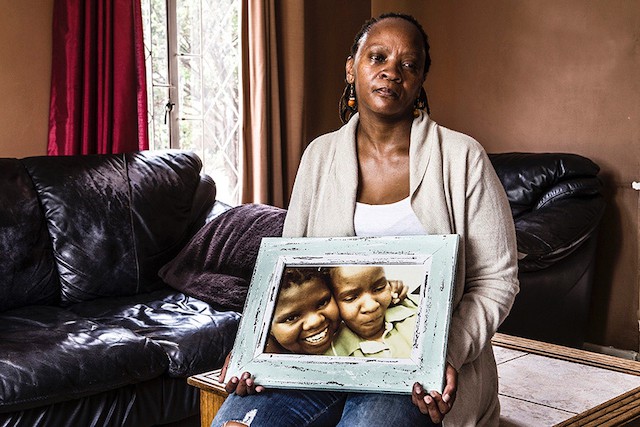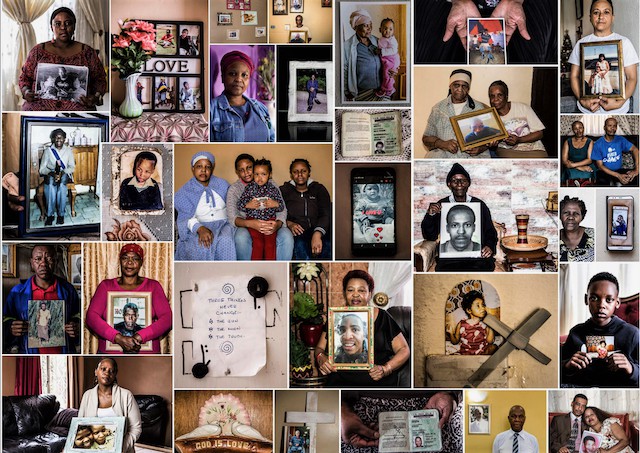“Never forget how they died”- Life Esidimeni online memorial launched
Website will allow people to lay complaints and report service issues
Christine Nxumalo of the Life Esidimeni Family Committee with a picture of her late sister Virginia Machpelah and late niece Shanice. Photo: Mark Lewis
- A memorial has been launched for the victims of the Gauteng health department’s negligence in what has become known as the Life Esidimeni scandal.
- Also set up, is an SMS line for people to report problems at health facilities.
- An inquest of the Life Esidimeni deaths will be held in the Pretoria High Court starting on 19 July.
Health activists launched an online memorial and advocacy project on Thursday to keep alive the memory of the over 100 people with mental health problems who died due to the negligence of the Gauteng Department of Health, after they were removed from Life Esidimeni centres in 2016.
Bereaved family members joined the launch with SECTION27, the South African Human Rights Commission, and the South African Depression and Anxiety Group (SADAG).
The online platform offers links to helplines and counselling services which offer referrals, information and support.
“We also want to empower people, whether it’s patients or family members, on how to report complaints or to report mental health issues, which is one of the biggest lessons to come out of Life Esidimeni,” said Cassey Chambers from SADAG. “We can work together towards fixing our mental health system and prevent another Life Esidimeni tragedy from happening again.”
The site has an SMS number for people to report any problems they experience at a clinic or hospital nationwide, if they are unable to access the right services or treatment, or to report a medical stock out.
“A trained SADAG councillor will be available to offer them help and assist them as much as possible to help them to navigate the mental health system and ensure that they get treatment,” said Chambers.
The site also provides guidance on how to report and lay a complaint about a mental health facility, how to directly contact the provincial departments of health, and how to report or lay a complaint against a healthcare professional.
Christine Nxumalo of the Life Esidimeni Family Committee said the families who had lost loved ones in the tragedy were happy to be part of the process which allowed them to tell their stories.
Nxumalo lost her sister Virginia Machpelah after she was placed in an NGO.
“The website pays tribute to us families and our loved ones. It’s important for us to continue telling our stories but more importantly, to never forget how they died,” said Nxumalo.
Author Harriet Perlman said the website tries to capture what happened by building a story with pictures of the families and those they had lost.
Perlman was part of the team that conducted interviews and visited the families to note their experiences over the last two years.
“Some people only had one photograph left, and that was an ID book. Everyone spoke about their loved ones and the horror that occurred remained so raw five years later. People also spoke of the desperate months they had spent looking for their loved ones, some spending almost a year looking for them,” said Perlman.
The Life Esidimeni online memorial and advocacy project includes the personal stories of 20 families who lost loved ones.
Inquest
Sasha Stevenson of SECTION27 said there were three levels of accountability needed in the inquest launched by the National Prosecuting Authority in the Life Esidimeni case.
First, for the state to take accountability for what happened, which was achieved through arbitration.
Second, for professional accountability from the healthcare workers and professional bodies involved. “So far the progress there has been extraordinarily slow,” said Stevenson. “We’ve been getting updates but there doesn’t seem to be finalisation of any of the disciplinary processes that should have happened. That’s hugely problematic.”
The third level is criminal accountability, said Stevenson. “The inquest is not a criminal trial but an opportunity for the judge to determine the legal cause of death and whether it looks like any act that amounted to a criminal offence led to the deaths and whether a prosecution should follow.”
The inquest is set to start on 19 July 2021 at the Pretoria High Court. The hearing is open to the public.
Next: Solidarity protest for dock workers who stalled Israeli ship
Previous: Bail granted for two Abahlali leaders accused of conspiracy to murder
© 2021 GroundUp. This article is licensed under a Creative Commons Attribution-NoDerivatives 4.0 International License.
You may republish this article, so long as you credit the authors and GroundUp, and do not change the text. Please include a link back to the original article.
We put an invisible pixel in the article so that we can count traffic to republishers. All analytics tools are solely on our servers. We do not give our logs to any third party. Logs are deleted after two weeks. We do not use any IP address identifying information except to count regional traffic. We are solely interested in counting hits, not tracking users. If you republish, please do not delete the invisible pixel.




